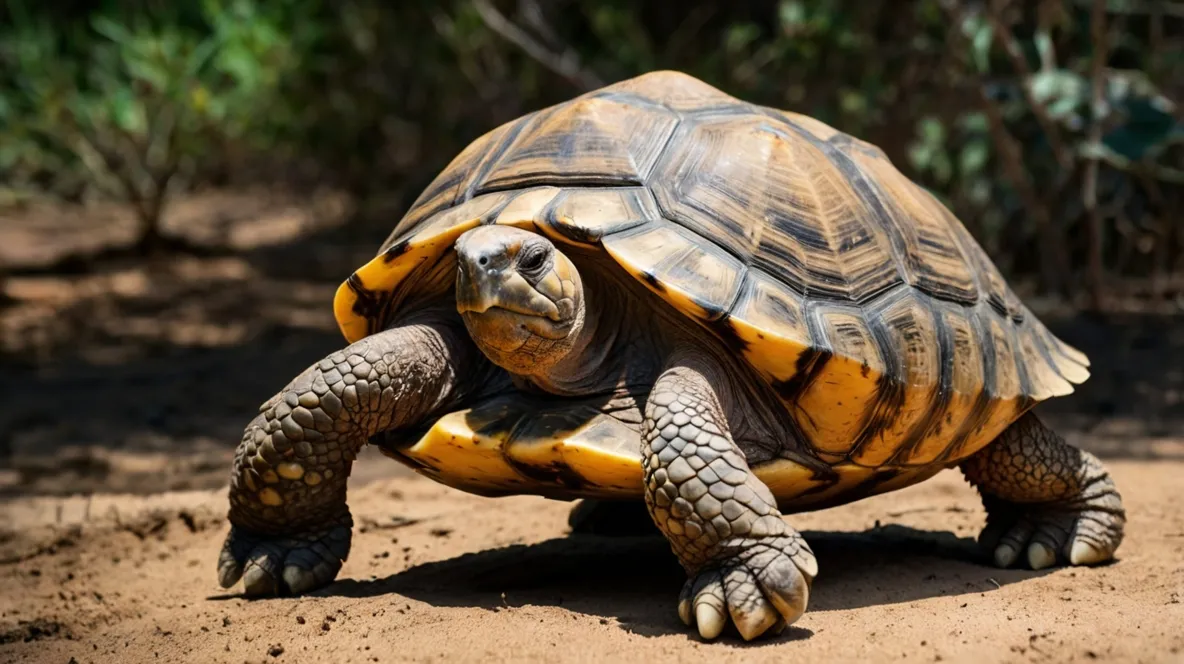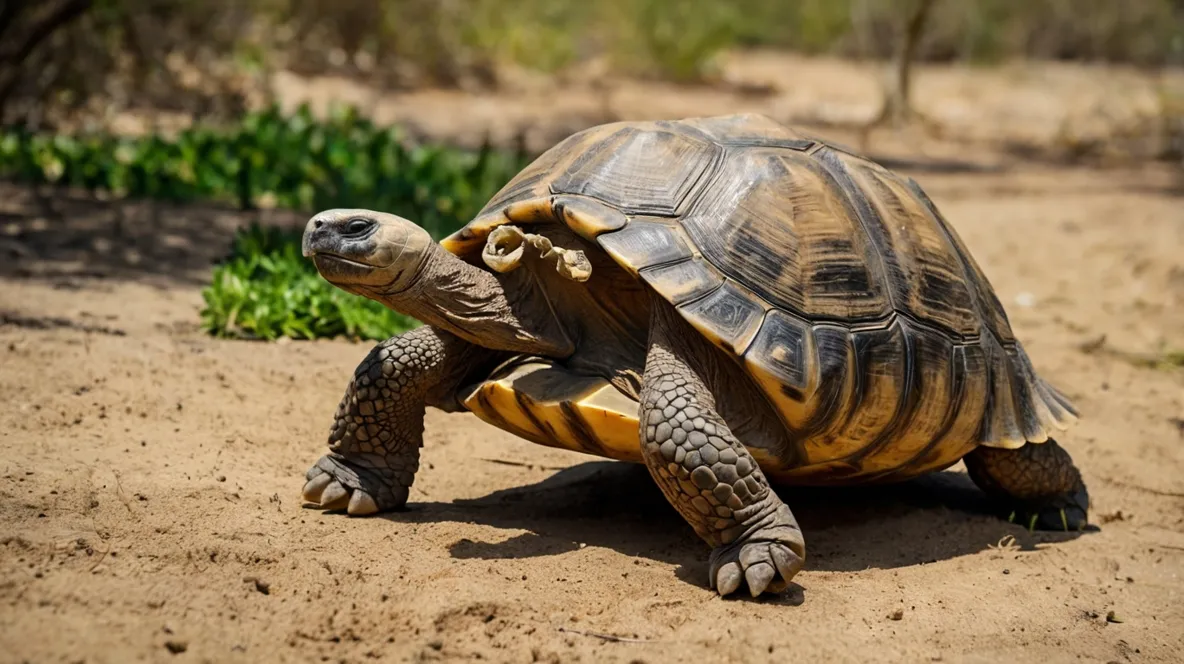Tortoise Medical Information & Health Guide
Understanding Tortoise Health
Tortoises are long-lived reptiles whose health heavily relies on species-specific husbandry, particularly diet, temperature, humidity, and access to UVB. Many common health problems are preventable with proper care. Recognizing issues early is crucial as they can be slow to show symptoms. This guide provides general information only and is NOT a substitute for professional veterinary assessment and treatment. Always consult a veterinarian experienced with tortoises for health problems.

Common Tortoise Health Issues
Understanding potential ailments is key to proactive care.
- Metabolic Bone Disease (MBD): Caused by insufficient calcium, excess phosphorus, lack of Vitamin D3 (from UVB exposure or proper supplementation), or incorrect temperatures affecting metabolism.
- Symptoms: Soft shell (esp. plastron), misshapen shell growth, pyramiding (raised scutes – multifactorial), lethargy, weakness, difficulty walking, deformed beak or limbs, possible tremors.
- Prevention: High-fiber, high-calcium, low-protein diet appropriate for the species (mostly grasses/weeds for grazers), correct calcium supplementation (use phosphorus-free calcium), adequate UVB lighting (strong bulbs replaced regularly) or natural sunlight exposure, proper temperature gradients.
- Note: Requires immediate vet care. Shell deformities are often permanent. Correcting husbandry is vital.
- Respiratory Infections (RI): Often called Runny Nose Syndrome (RNS). Caused by incorrect temperatures (too cold, drafts), improper humidity, dusty substrate, poor nutrition (esp. Vit A deficiency), stress, or contagious pathogens (like Mycoplasma).
- Symptoms: Nasal discharge (clear or bubbly at first, can become thick/cloudy), wheezing, clicking, open-mouth breathing, wiping nose on forelimbs, lethargy, loss of appetite, puffy eyes.
- Prevention: Maintain correct temperature gradients and humidity, avoid drafts, use low-dust substrates, provide proper diet (including Vitamin A sources), quarantine new animals, minimize stress.
- Note: Contagious. Requires veterinary diagnosis (possibly cultures, blood work) and specific treatment (antibiotics, supportive care). Mycoplasma infections can be chronic.
- Shell Rot (SCUD – Septicemic Cutaneous Ulcerative Disease): Bacterial or fungal infection affecting the shell (carapace or plastron) or skin. Often starts due to injury, persistently damp/unhygienic conditions, or burns.
- Symptoms: Pitting, soft spots, discoloration, discharge, or foul odor from the shell; ulcers or lesions on the skin. Can become systemic if untreated.
- Prevention: Keep enclosure clean and dry (provide appropriate humidity levels but avoid constant dampness), smooth enclosure surfaces to prevent scratches, ensure heat sources cannot cause burns.
- Note: Needs veterinary debridement, cleaning, and topical/systemic medications based on culture results. Address underlying husbandry issues.
- Pyramiding: Abnormal, raised, pyramid-like growth of shell scutes. Multifactorial, but strongly linked to diet (excess protein, calories), rapid growth, incorrect humidity (often too low for many species, esp. hatchlings), and possibly other factors like lack of exercise.
- Symptoms: Conical or raised vertebral and costal scutes.
- Prevention: Provide a species-appropriate high-fiber, low-protein diet; maintain correct humidity levels (often higher humidity is needed for smoother growth, especially in young tortoises); avoid overfeeding; encourage exercise.
- Note: Existing pyramiding is permanent, but correcting husbandry can promote smoother new growth.
- Parasites (Internal & External): Internal worms (like pinworms, roundworms) and protozoa are common. External parasites like ticks can occur, especially in outdoor tortoises.
- Symptoms (Internal): Weight loss despite good appetite (or loss of appetite), lethargy, abnormal feces (diarrhea, undigested food), straining. Pinworms often asymptomatic unless in huge numbers.
- Symptoms (External): Visible ticks attached to skin, often in crevices.
- Prevention: Quarantine new animals, regular fecal checks by vet, maintain hygiene, check outdoor tortoises regularly for ticks.
- Note: Requires veterinary diagnosis (fecal floatation) and specific dewormers. Ticks should be removed carefully by a vet or experienced keeper.
- Bladder Stones (Uroliths): Hard mineral deposits forming in the bladder, often linked to chronic dehydration and/or high protein diets. Common in desert species (e.g., Sulcatas).
- Symptoms: Straining to urinate/defecate, lethargy, loss of appetite, sometimes hind limb weakness/paralysis due to pressure. May not show signs until large.
- Prevention: Ensure constant access to fresh water, regular soaking (especially for desert species), provide appropriate diet low in protein and oxalates.
- Note: Diagnosed via vet exam, X-rays. Often requires surgical removal.
- Vitamin A Deficiency (Hypovitaminosis A): Due to improper diet lacking sufficient Vitamin A.
- Symptoms: Swollen eyelids (often sealing eyes shut), respiratory infections, ear abscesses (aural abscesses – firm swellings behind the jaw).
- Prevention: Feed a varied diet rich in Vitamin A (dark leafy greens, dandelions, hibiscus, colored vegetables *sparingly* according to species). Use supplements carefully if needed, under vet guidance.
- Note: Requires veterinary treatment (Vit A injections, antibiotic eye drops, possible abscess surgery).
- Herpesvirus (Tortoise Herpesvirus – TeHV): Contagious viral disease, different strains affect different species/regions. Can be fatal.
- Symptoms: Often severe stomatitis (mouth lesions/plaques), rhinitis (nasal discharge), conjunctivitis, lethargy, anorexia. Can be carried asymptomatically.
- Prevention: Strict quarantine, avoid mixing species, buy from reputable breeders who may test. Good hygiene. No vaccine readily available for all strains.
- Note: Diagnosis via PCR testing. Treatment is supportive; antiviral drugs have limited success. High mortality rate in susceptible animals.
Prevention Through Excellent Husbandry
Keeping your tortoise healthy starts with replicating its natural environment and diet as closely as possible.

- Species-Specific Diet: Research heavily! Most need high-fiber, low-protein diets (grasses, weeds, safe browse). Avoid fruits, excessive vegetables, and commercial pellets high in protein/fillers.
- Correct Temperatures: Provide a proper thermal gradient with a warm basking spot (species-dependent temperature) and cooler areas. Ensure appropriate night temperatures.
- UVB Lighting/Sunlight: Essential for Vitamin D3 synthesis and calcium metabolism. Use high-quality UVB bulbs (mercury vapor or T5 HO fluorescent) replaced regularly, or provide safe access to unfiltered natural sunlight.
- Humidity & Hydration: Maintain appropriate humidity levels for the species (may require misting, humid hides, specific substrates). Provide constant access to shallow, fresh water for drinking and soaking. Regular soaking is beneficial for many species.
- Space & Exercise: Tortoises need ample space to roam. Outdoor enclosures are ideal when weather permits. Indoor enclosures must be large.
- Substrate: Use safe, appropriate substrates that allow burrowing and maintain humidity if needed (e.g., coco coir, cypress mulch, topsoil mixes). Avoid sand, gravel, or overly dusty materials.
- Quarantine: Isolate new tortoises for 3-6 months minimum due to the slow nature of some diseases. Strict hygiene between established and new animals.
- Regular Weigh-Ins: Monitor weight regularly (e.g., monthly) to detect subtle weight loss.
General Signs of Illness in Tortoises
Contact your vet if you observe any of these signs:
- Changes in appetite or water intake (increase or decrease)
- Weight loss
- Lethargy, excessive sleeping, inactivity
- Nasal discharge, wheezing, clicking, open-mouth breathing
- Puffy, swollen, or closed eyes
- Swelling around the ears (aural abscess)
- Changes in shell condition (softness, damage, discharge, unusual growth)
- Abnormal feces (diarrhea, unusual color, undigested food) or lack of feces/urine
- Straining to urinate or defecate
- Weakness, difficulty walking
- Visible parasites (ticks)
- Redness or discharge from mouth
Finding an Experienced Tortoise Veterinarian
Tortoise medicine is specialized. Finding a knowledgeable vet is crucial.
- Seek True Reptile/Tortoise Vets: Not just “exotics” vets. Ask about their specific experience with chelonians (turtles and tortoises).
- Check Tortoise Rescues/Societies: These organizations often have lists of recommended vets in their area.
- ARAV Directory: Use the Association of Reptilian and Amphibian Veterinarians website as a starting point.
- Ask Key Questions: Inquire about their familiarity with common tortoise diseases (MBD, RI, Mycoplasma, Herpesvirus), diagnostic tools (X-ray, blood work, fecal analysis), and treatment options (including surgery like bladder stone removal).
- Establish Baseline Care: Annual check-ups, including fecal exams, are highly recommended, especially for outdoor tortoises.